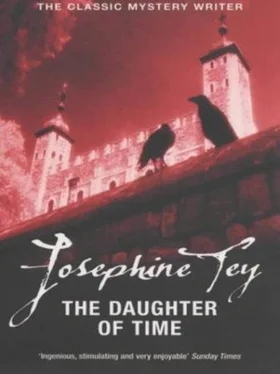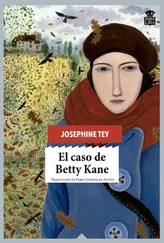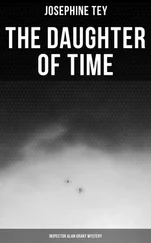Did that bring one any nearer the murder of the two boys?
It didn’t, did it?
If the story was false, the person to be got rid of was Stillington. Lady Eleanor had died in her convent long ago, so was not there to blow Titulus Regius to pieces any time she had a mind. But Stillington could. And Stillington evidently showed no difficulty in going on living. He survived the man he had put on the throne.
The sudden jar in the proceedings, the abrupt break in the pattern of the coronation preparation, was either wonderful stage-managing or just what one would expect if the thunderclap of Stillington’s confession descended on prepared ears. Richard was – what? Eleven? Twelve? – when the Butler contract was signed and witnessed; it was unlikely that he knew anything of it.
If the Butler story was an invention to oblige Richard, then Richard must have rewarded Stillington. But there was no sign of Stillington’s being obliged with a cardinal’s hat, or preferment, or office.
But the surest evidence that the Butler story was true lay in Henry VII’s urgent need to destroy it. If it were false, then all he had to do to discredit Richard was to bring it into the open and make Stillington eat his words. Instead he hushed it up.
At this point Grant realised with disgust that he was back on the Defence side again. He decided to give it up. He would take to Lavinia Fitch, or Rupert Rouge, or some other of the fashionable authors lying in such expensive neglect on his table, and forget Richard Plantagenet until such time as young Carradine appeared to renew the inquisition.
He put the family-tree sketch of Cicely Nevill’s grandchildren into an envelope and addressed it to Carradine, and gave it to The Midget to post. Then he turned-down the portrait that was leaning against the books, so that he should not be seduced by that face which Sergeant Williams had placed, without hesitation, on the bench, and reached for Silas Weekley’s The Sweat and the Furrow . Thereafter he went from Silas’s seamy wrestlings to Lavinia’s tea-cups, and from Lavinia’s tea-cups to Rupert’s cavortings in the coulisses , with a growing dissatisfaction, until Brent Carradine once more turned up in his life.
Carradine regarded him anxiously and said: ‘You don’t look so bright as last time I saw you, Mr Grant. You not doing so well?’
‘Not where Richard Is concerned, I’m not,’ Grant said. ‘But I’ve got a new piece of Tonypandy for you.’
And he handed him Laura’s letter about the drowned women who were never drowned.
Carradine read it with a delight that grew on him like slow sunlight coming out, until eventually he glowed.
‘My, but that’s wonderful. That’s very superior, first growth, dyed-in-the-wool Tonypandy, isn’t it. Lovely, lovely. You didn’t know about this before? And you a Scotsman?’
‘I’m only a Scot once removed,’ Grant pointed out. ‘No; I knew that none of these Covenanters died “for their Faith”, of course; but I didn’t know that one of them – or rather, two of them – hadn’t died at all.’
‘They didn’t die for their Faith?’ Carradine repeated, bewildered. ‘D’you mean that the whole thing ’s Tonypandy?’
Grant laughed. ‘I suppose it is,’ he said, surprised. ‘I never thought about it before. I’ve known so long that the “martyrs” were no more martyrs than that thug who is going to his death for killing that old shop-keeper in Essex, that I’ve ceased to think about it. No one in Scotland went to his death for anything but civil crime.’
‘But I thought they were very holy people – the Covenanters, I mean.’
‘You’ve been looking at nineteenth-century pictures of coventicles. The reverent little gathering in the heather listening to the preacher; young rapt faces, and white hair blowing in the winds of God. The Covenanters were the exact equivalent of the I.R.A. in Ireland. A small irreconcilable minority, and as bloodthirsty a crowd as ever disgraced a Christian nation. If you went to church on Sunday instead of to a conventicle, you were liable to wake on Monday and find your barn burned or your horses hamstrung. If you were more open in your disapproval you were shot. The men who shot Archbishop Sharp in his daughter’s presence, in broad daylight on a road in Fife, were the heroes of the movement. “Men of courage and zeal for the cause of God”, according to their admiring followers. They lived safe and swaggering among their Covenanting fans in the West for years. It was a “preacher of the gospel” who shot Bishop Honeyman in an Edinburgh street. And they shot the old parish priest of Carsphairn on his own doorstep.’
‘It does sound like Ireland, doesn’t it,’ Carradine said.
‘They were actually worse than the I.R.A. because there was a fifth column element in it. They were financed from Holland, and their arms came from Holland. There was nothing forlorn about their movement, you know. They expected to take over the Government any day, and rule Scotland. All their preaching was pure sedition. The most violent incitement to crime you could imagine. No modern Government could afford to be so patient with such a menace as the Government of the time were. The Covenanters were continually being offered amnesties.’
‘Well, well. And I thought they were fighting for freedom to worship God their own way.’
‘No one ever stopped them from worshipping God any way they pleased. What they were out to do was to impose their method of church government not only on Scotland but on England, believe it or not. You should read the Covenant some day. Freedom of worship was not to be allowed to anyone according to the Covenanting creed – except the Covenanters, of course.’
‘And all those gravestones and monuments that tourists go to see—’
‘All Tonypandy. If you ever read on a gravestone that John Whosit “suffered death for his adherence to the Word of God and Scotland’s Covenanted work of Reformation”, with a touching little verse underneath about “dust sacrificed to tyranny”, you can be sure that the said John Whosit was found guilty before a properly constituted court, of a civil crime punishable by death and that his death had nothing whatever to do with the Word of God.’ He laughed a little under his breath. ‘It’s the final irony, you know, that a group whose name was anathema to the rest of Scotland in their own time should have been elevated into the position of saints and martyrs.’
‘I wouldn’t wonder if it wasn’t onomatopoeic,’ Carradine said thoughtfully.
‘What?’
‘Like the Cat and the Rat, you know.’
‘What are you talking about?’
‘’Member you said, about that Cat and Rat lampoon, that rhyme, that the sound of it made it an offence?’
‘Yes; made it venomous.’
‘Well, the word dragoon does the same thing. I take it that the dragoons were just the policemen of the time.’
‘Yes. Mounted infantry.’
‘Well, to me – and I suspect to every other person reading about it – dragoons sound dreadful. They’ve come to mean something that they never were.’
‘Yes, I see. Force majeure in being. Actually the Government had only a tiny handful of men to police an enormous area, so the odds were all on the Covenanters’ side. In more ways than one. A dragoon (read policeman) couldn’t arrest anyone without a warrant (he couldn’t stable his horse without the owner’s permission, if it comes to that), but there was nothing to hinder a Covenanter lying snug in the heather and picking off dragoons at his leisure. Which they did, of course. And now there’s a whole literature about the poor ill-used saint in the heather with his pistol; and the dragoon who died in the course of his duty is a Monster.’
Читать дальше












